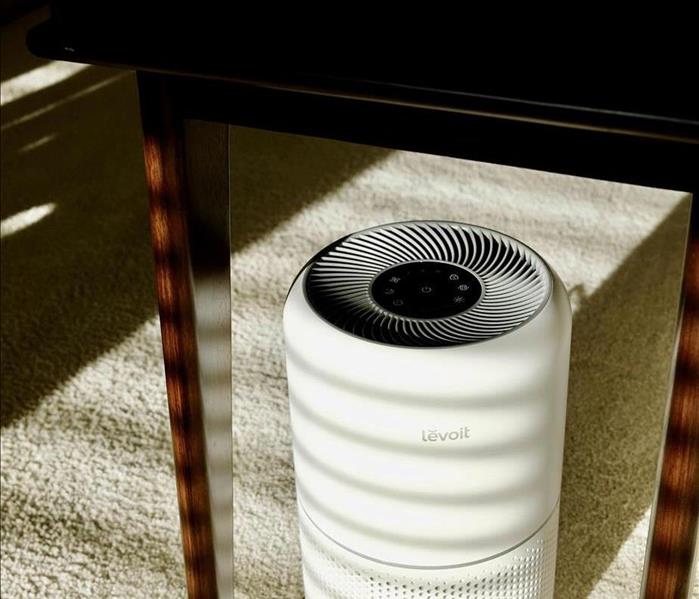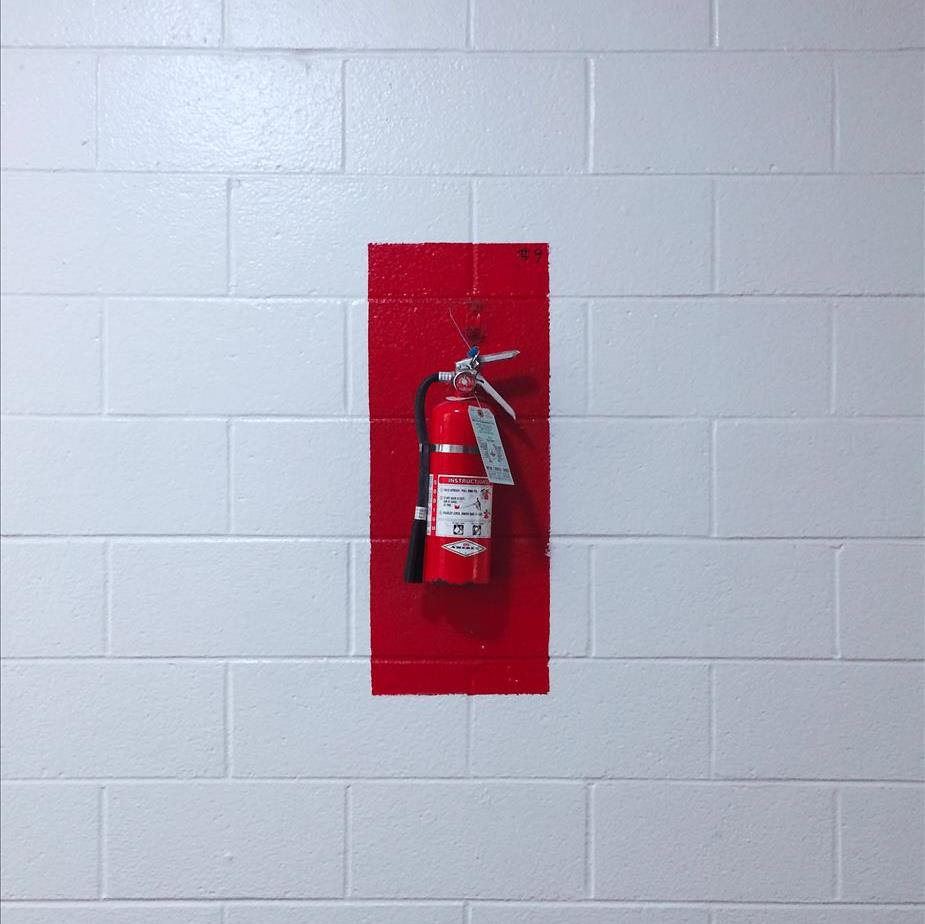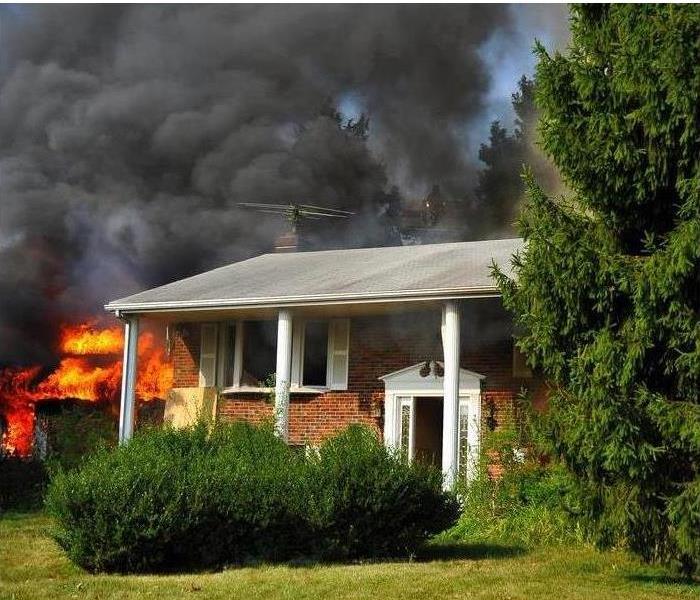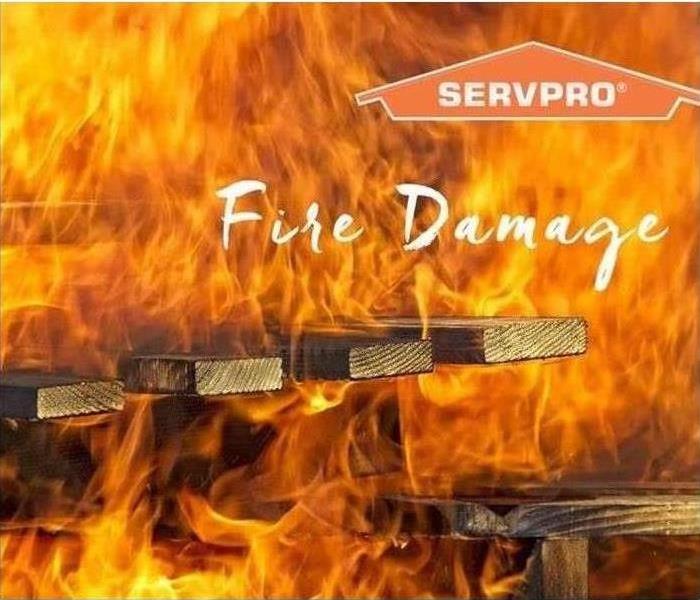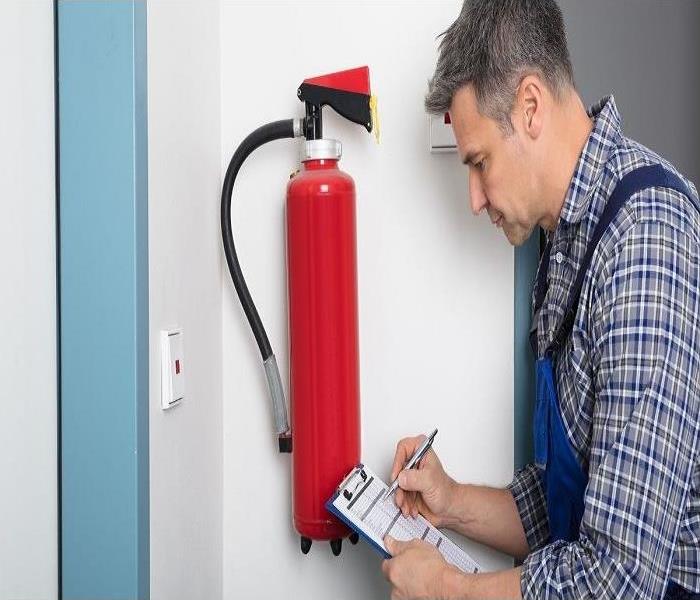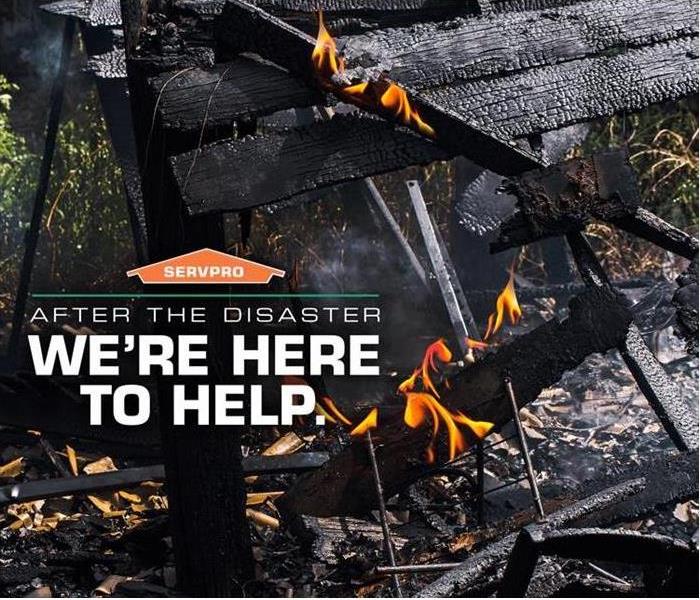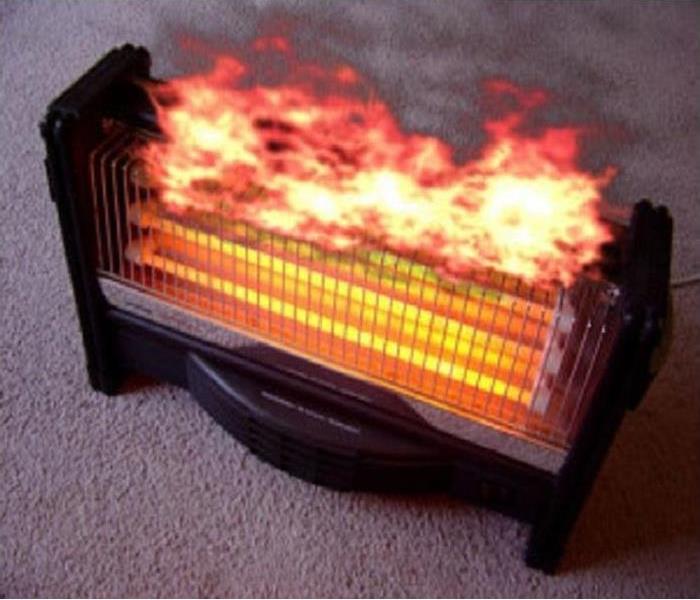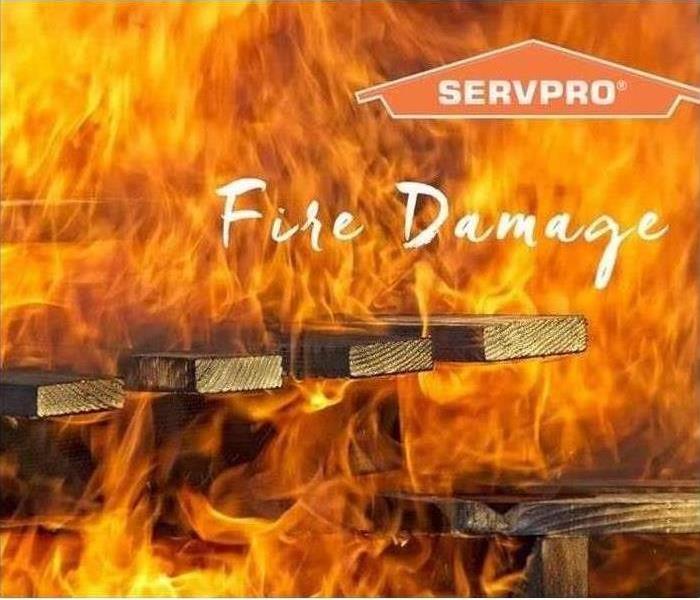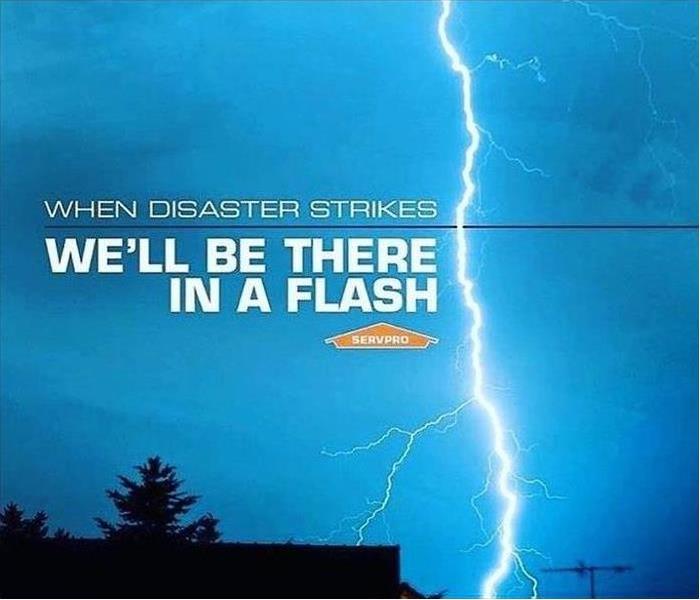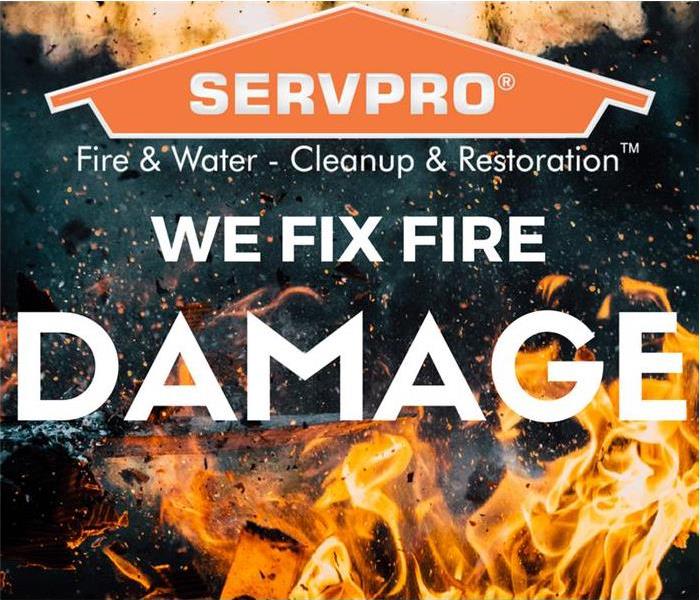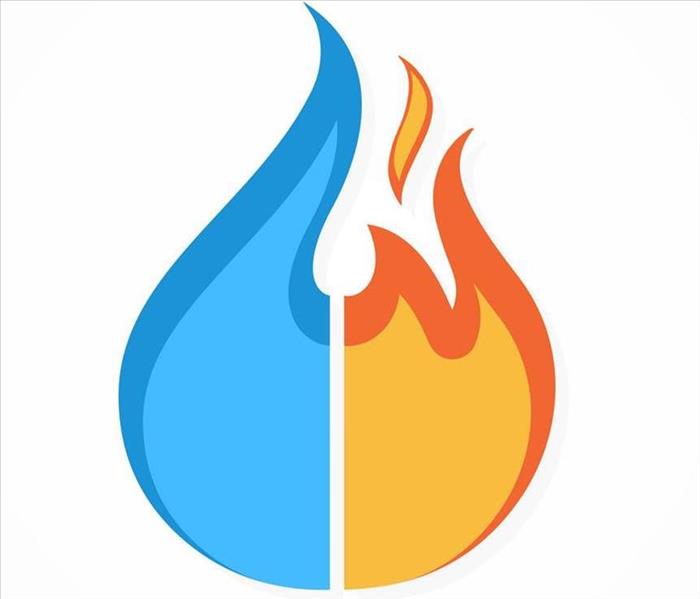Archived Fire Damage Blog Posts
Avoiding Spring Fire Damage to Your Home in Illinois
3/25/2024 (Permalink)
As spring arrives, bringing warmer temperatures and outdoor activities, it's crucial to stay aware of potential fire hazards that could endanger your home. Here are three important fire hazards to keep in mind during the spring season:
1. Grill Safety: With the onset of warmer weather, many people look forward to grilling outdoors. However, it's essential to exercise caution to prevent accidents. Position your grill away from flammable materials like overhanging branches or wooden decks. Always have a fire extinguisher nearby and never leave the grill unattended while in use.
2. Proper Yard Debris Disposal: Spring cleaning often involves clearing away yard debris such as leaves, branches, and dead vegetation. While cleaning up your outdoor space is important, it's equally important to dispose of these materials safely. Avoid burning yard waste on windy days and follow local regulations for outdoor burning. Consider composting or using designated disposal methods to reduce the risk of accidental fires.
3. Safe Use of Electrical Equipment: As spring brings increased outdoor activities, there's a higher demand for electrical equipment like lawnmowers, trimmers, and power tools. Before using these devices, inspect their cords and outlets for signs of damage or wear. Avoid overloading circuits and keep electrical equipment away from water sources at all times.
By staying vigilant and addressing these common fire hazards, you can protect your home and family throughout the spring season. Remember to install and maintain working smoke detectors in your home and develop a fire escape plan for emergencies. In the event of fire damage, you can rely on SERVPRO for professional restoration and cleanup services. Stay safe and enjoy the spring season!
Steps to take in the aftermath of a commercial fire
1/23/2024 (Permalink)
If your business has ever experienced a fire then, you understand how devastating the aftermath can be. Issues created by flames and soot, additionally your business can suffer more loss due to water damage that occurred when firefighters put out the flames. Mix in lingering smoke odor and you are looking at a lot of issues to deal with after the final flame is extinguished. No need to panic. When a fire impacts your business, the best thing to do is to follow the steps listed below that will help you get things back to normal as quickly as possible.
- Be sure to document any damage- Once the firefighters give the okay to reenter the building, go inside and assess the damage. Don’t remove anything. Instead, take note of the damage and document it with pictures, videos, and lists of what you lost in the blaze. Don’t move anything or try to salvage items before your insurance adjuster is able to assess the damage and document it for business purposes. Simply taking note of the damage and preparing it for your insurance company is what is needed at this point.
- Contact your insurance agent– Call your insurance provider immediately. If it is after business hours, call the corporate number or get the claim started via the corresponding app if possible. Informing your insurance company as quickly as possible will help with the claims process. Even while firefighters are still battling the blaze, placing a call to your insurance company is a good idea. The SERVPRO associate on-site can assist you with this.
- Contact your local SERVPRO- We want you to be able to get back to business just as badly as you do. At SERVPRO our employees are certified experts who know exactly what needs to be done to get your business back on track following a fire. Other damage restoration work we can do for you and your business includes Commercial Water Damage, Board Ups, Content Restoration, and Biohazard Restoration.
To get in touch with SERVPRO, simply call one of our friendly staff at 217-355-0077 24/7 and we will send someone over to help you with what you need. We are in the business of helping people!
Warm Weather Fire Risk
6/13/2022 (Permalink)
Rainy, cold and dreary weather is finally gone, and the warmer months are here for a while! Thinking about warmer weather can be exciting, but it’s also a time to think about fire safety for your home or business.
Did you know that spring and summer sees more daily fires on average than any other time of year? It’s true, but there are steps you can take to lower your risk.
Here are some common fire threats and ways to protect yourself:
The Grill.
Almost 9,000 fires a year are related to grilling accidents. They create the perfect combination of flames, heat, grease, and gas, which can make things escalate quickly. Make sure you are taking care of the essentials to help prevent a fire. Verify that the grill is in good working condition, have it placed at least three feet away from everything and clean it before each use. Cleaning the grill before each use is critical because [almost 20% of grill fires are due to poor cleaning]. (https://hgi-fire.com/blog/spring-has-sprung-fires-safety-tips-for-the-warmer-months/).
Fire Pits.
Campfire accidents spike as soon as summer rolls around. Usually burns account for three out of four camping injuries in children younger than 16. So, never leave your children unattended near a fire pit. It’s also a good idea to keep a bucket of water or drag a water hose close to the pit. You should never add leaves or pine needles to the fire, and finally, put the fire out slowly to avoid scattering embers.
Chimneys and Dryer Vents.
Warmer months are the perfect time to do your annual chimney inspection. Having your chimney inspected and cleaned helps avoid a potentially dangerous buildup of ashes. Another yearly maintenance service to consider is having your dryer vent pipe cleaned out. Lint, even if you clean the filter in the dryer every time, can build up quickly in the pipes.
At SERVPRO, we have technicians on hand 24/7. These technicians are ready and waiting, no matter the cause of fire, to help you make it “Like it never even happened.” Contact SERVPRO of Piatt/DeWitt Counties today to talk with a specialist.
Importance of Cleaning Electronics after a Fire
6/7/2022 (Permalink)
Why Should You Have Your Electronics Cleaned After a Fire?
If you have experienced a fire, you may not be sure whether electronics are safe to use. Even if a device was not destroyed, intense heat may have warped or otherwise affected delicate internal components. Restoring computers and devices filled with smoke and coated with soot is an important part of fire cleanup. Smoke damage poses several risks to electronics:
• Acidity: The acidity of smoke destroys metals and can cause them to disintegrate. Exposure to corrosive acids in the air may cause devices to fail or behave unpredictably in ways that may be dangerous. Electronics restoration experts can make sure that devices are safe to use and identify which items you should replace.
• Coated Components: Any device found near a fire is likely to require fire cleanup to remove all traces of smoke and soot. The black film which develops over internal components may insulate the heat-producing parts of an electronic device and cause circuits to short. In addition to causing a device to overheat, the chemicals in smoke and soot will adhere to any dust or debris already in a machine and intensify the damage.
• Lost data: Smoke or fire damage may wipe out hard drives, memory, and storage volumes. Even backup drives may be ruined. Electronics restoration professionals can help you retrieve as much data as possible. Keep in mind that the extent of the fire or smoke damage may limit how much can be salvaged.
You may be able to clean the exterior of your device by wiping it down, but you should depend on the professional expertise of a certified fire cleanup service Piatt/DeWitt County to restore electronics to working order. You should also take pictures or video to document the extent of the damage to your devices in case some of these items are beyond repair and you need to file claims for replacements.
Space Heater Safety
2/28/2022 (Permalink)
When the temperature drops, portable space heaters can be a convenient source of supplemental heat for your home. But as reports of triggered house fires continue to grab headlines, many people are wondering: are portable heaters dangerous? No, unless yours is very old or you are using it incorrectly. According to the NFPA in 2018 heating equipment was the second-leading cause of U.S. home fires and the third-leading cause of home fire deaths.
Space Heater Safety Tips
- Do not plug them into a power strip! Space heaters should be plugged directly into a wall outlet. Do not plug any other electrical devices into the same outlet as the heater. Because of the energy load and extra electrical current flow that a space heater generates, if it is plugged into a power strip, it could overheat and result in a fire.
- Always read and follow the instructions and heed warning labels.
- Don't leave a space heater on while you are sleeping.
- it is plugged in.
- Space heaters are only meant to provide supplemental heating, no cooking, drying clothing or thawing frozen pipes.
- Position your space heaters so that they are at least three feet away from anything that can burn such as furniture, drapes, pillows, bedding and paper.
- Position space heaters on the floor where the surface is level and flat.
- Keep heaters away from high foot-traffic areas to reduce the chance of them being tripped over and/or otherwise being kicked over.
- Do not put space heaters on chairs, furniture, counters or tables where they will be unstable and/or could overheat and catch fire.
- Don not put anything over the top of a space heater.
- Unplug space heaters when not in use.
- Purchase a heater with tip-over protection, which means the space heater will automatically shut off if it is tipped over.
- Purchase a heater with overheat protection, which means the space heater will automatically shut off if its internal components get too hot.
P.A.S.S. Method
2/21/2022 (Permalink)
Would you know how to stop a fire at a moment's notice? If you have never operated a fire extinguisher, you should read closely as we go through the P.A.S.S. method. By following these four easy steps, you can ensure that you keep your property safe from a potential complete loss.
Pull the pin. When the pin is pulled, it will also break the tamper seal.
Aim low; the hottest part of the fire is at the base of the fire. That means that when directing the extinguisher, you should aim towards the base/ hottest part of the fire.
Squeeze the handle. This will send the extinguishing agent into the fire, which ultimately ends the fire.
Sweep from side to side. It is best not to let go of the handle when directing the agent until the fire appears to be out.
You can save your property from a potential complete loss by learning these quick and easy tips on operating an extinguisher. If the fire grows out of control, leave the property immediately. If you need our fire restoration services, don't hesitate to get in touch with SERVPRO of Piatt/DeWitt Counties.
How Fire Damage Can Lead to Water Damage
1/31/2022 (Permalink)
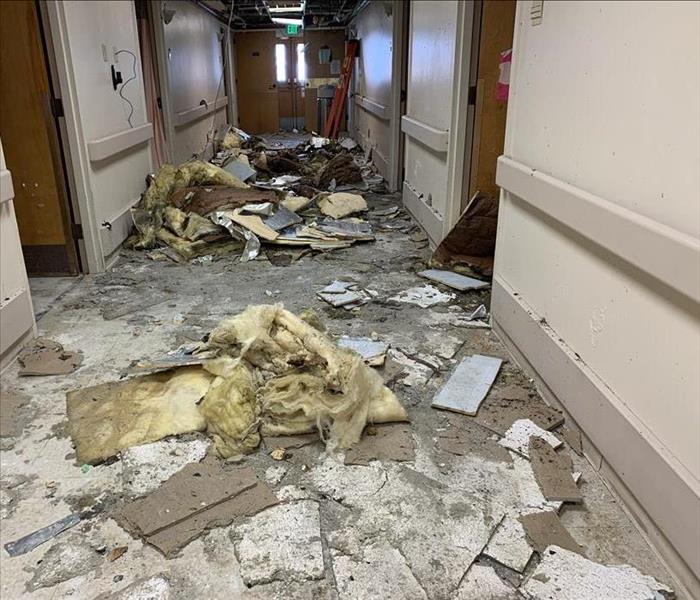 Water used in firefighting efforts can cause additional damage to the structure.
Water used in firefighting efforts can cause additional damage to the structure.
When a fire occurs, many are concerned with the potential of catastrophic. But did you know that water damage can occur as a result of fire damage?
• A fire will remove most or all insulation from walls which in turn causes condensation on interior surfaces like windows and ceilings. Condensation on windows and ceilings may drip down onto furniture and floors.
• Firefighting efforts can cause water damage to a structure during the firefighting process. Even if fire sprinkler systems are working correctly, they are designed to extinguish a fire - not to prevent water from entering your home.
When the fire department leaves, there is still plenty of work to get you back to “Like it never even happened.” Water used in the firefighting efforts will still need to be dried and extracted so that fire damage restoration can occur.
At SERVPRO, we work diligently to help prevent water damage and to respond quickly when it occurs. We offer premier water damage fire cleanup and fire restoration services in Piatt and DeWitt Counties. Contact SERVPRO of Piatt/DeWitt Counties at 217-935-2992.
Electronics Fires Are a Risk for Most Homes
1/10/2022 (Permalink)
Fires caused by electronics are on the rise in household across the country. More and more homes are investing in various types of electronics, all in need of charging at one point or another, and often left unattended while they’re charging. While there are basic safety habits that we should follow for these devices, most of us disregard these habits and put our homes at risk. When a house fire caused by electronics occurs, and the recovery process can be tough.
Preventing a house fire from electronics
Computer, tablet, and cell phone chargers need space for air circulation, as they put off a substantial amount of heat during charging cycles which must be dispersed with the right amount of ventilation. Unfortunately, it’s not uncommon for people to put these chargers by their beds, surrounded by flammable items which can cause significant heat. Devices that are covered up and not able to “breathe” can build up the heat and ignite a fire; often when no one is home to quickly extinguish the flames or asleep and unaware a fire has started. The lithium-ion batteries in these devices have containers that are pressurized and can rupture if the temperature goes up too fast or melt if they are heated for a long time. Many people think electronics fires are caused by faulty chargers, but these fires can happen when devices are on a charger or not. Following basic safety rules can protect your home from a house fire. Fire damage in your home from your electronic devices is almost entirely avoidable with a little diligence in following safety rules. Not charging your phone in or by your bed, and making sure all devices are on a hard, flat surface while charging helps avoid these disasters. Also keeping any charging electronic uncovered to allow for proper air circulation helps with overheating and potential fire damage.
If you experience an electronics fire
If you experience fire from an overheated cell phone, tablet, or other devices, there’s additional clean-up to face once the flames are extinguished. It’s best to leave the cleanup to the professionals at SERVPRO of Piatt/DeWitt Counties. SERVPRO has the training to know how to clean up your home after a fire of any kind and understand the special challenges of fires caused by electronics.
When electronics burn, they emit particles like those from burning plastics which become electrically charged are known as ionization. The particles can adhere to surfaces and can be a challenge to clean. At SERVPRO, we understand that because of this; clean up after an electronics fire takes special care to not only get rid of the smoke particles, but to eliminate the acrid smell that accompanies burned plastics. Our highly trained technicians use advanced technology to clean your home, remove the damaged electronics, and address any odor issues to restore your home to pre-fire conditions. When a SERVPRO technician arrives on the scene, they’ll do a comprehensive job evaluating the situation, providing you with a clear plan ahead of time so you know exactly what to expect.
Contact us when you need help
You can rest assured that your home can be cleaned and restored by our staff thoroughly when you reach out to us at (217) 935-2992. We’re available 24/7 to help you recover from a fire caused by electronics.
Protect Your Pets From a Fire
6/14/2021 (Permalink)
Help to save your pets and consider these tips when leaving your home
Keep pets close to the entrances while you're away from home.
Keep your pet collars and leashes ready in case your pet needs to be saved by firefighters
When you leave your pets home alone, keep them in areas or rooms near the exits where the firefighters can quickly spot them.
Save rescuers time by attaching the pet warning window to the cling and write down the number of pets inside your house and connect the static cling to the front door.
Prevent Your Pets from Starting Fires
The National Fire Protection Association estimates that almost 1,000 home fires are accidentally caused every year by pet owners. The American Kennel Club and ADT Security Services have joined forces to provide the following tips:
• Extinguish Open Flames
Pets are typically curious about cooking appliances, candles, or even a fire in your fireplace. Ensure that your pet is not left unattended by an open flame and ensure that any open flame is absolutely extinguished before you leave your home.
• Remove the stove knobs
Be sure to remove the stove knobs or protect them with the covers before you leave the house-the stove or stove is the number one piece of equipment where your pet can start a fire.
• Invest in Flameless Candles
These candles have a light bulb rather than an open flame, and they take the danger of your pet knocking on a candle. Cats are famous for starting fire when their tails turn on lit candles.
• Protected Young Pets
Keep them protected from potential fire hazards when you're away from home, such as in cages or behind child gates in secure areas.
Our Fire Damage Restoration Services
Because each situation of smoke and fire damage is slightly different, each needs a unique solution tailored to particular circumstances. We have the tools, skills, and experience to repair fire and smoke damage. We will treat your family with love and respect, as well as your property with care.
Do you have questions about Fire, Smoke, or Soot Damage? Call the SERVPRO of Piatt/Dewitt Counties team today at (217) 935-2992
How to Tackle Fire Damage and Save Money
6/14/2021 (Permalink)
Let’s face it. Just because it’s May doesn’t mean we have forgotten about those tumultuous holidays; Thanksgiving being that special time to fry your bird. Yes it can be tasty at times but it can also cause some havoc on your home. Fire damage may be something you have to deal with during these times. The U.S Fire Administration says about 2,000 Thanksgiving fires happen each year. Undoubtedly many of these cooks don’t have a handle on their turkey or their flames. House fires can be traumatizing for both you and your fowl. In some cases fire damage cannot be handled on your own.
Fire Damage
FEMA states that in any kind of disaster you and your family should always build an emergency kit and make a family communication plan in preparation. In cases of smaller fires take a look below on ways to DIY fire clean up.
If you decide you want to stay in your home after a fire, you need to make sure the fire damage was small enough to do so. Fumes and smoke can cause unlivable conditions for you and your family. Most likely if the fire was concentrated to a small area, like a stove, you should be fine. Yet it is highly recommended you call the fire department to make sure the fire didn’t spread through the walls or electrical outlets.
First Things First
Once you have an understanding of how extreme your fire damage is, you should start the cleanup immediately. Acquire gloves, masks and proper clothing to start this adventure. You must limit the movement in the home initially to reduce the amount of soot particles that can be embedded into other fabrics and furniture. This should include keeping your hands and shoes clean so as to not spread it further around the home. Cover all furniture with tarps and clean towels so no extra debris settles on them. This is where borrowing your grandmother’s plastic couch covers can come in handy. If you have any plants in the home they need fresh air too. Wipe the leaves with a damp towel and place outside for a couple hours, weather permitting. You must change your air filter as well as covering your vents. Wet cheese cloths over vents help capture those soot particles that may be traveling throughout your ventilation system.
Soot Clean Up
To begin your soot cleanup, it’s a wise idea to tackle as much soot as possible without water. Fire damage can create inches of debris on household services. Since soot contains oil, water can make the particles stain even further. Find a vacuum with a powerful cleaning nozzle and hold one inch above the soot to capture as much as possible.
Soot Clean Up
Soot cleanup from walls and ceilings can be a little tricky. Depending on the type of surface, like stated before, adding water can damage the surface further. Many specialty stores sell chemical sponges that clean up that soot quickly. Trisodium phosphate can be used as a cleaning agent as well. Combine one tablespoon with one gallon of water. Since it is a degreaser it can be used on countertops, plastics and walls. By combining trisodium phosphate with bleach it can also help with Mold Removal. For the first year after the fire be sure to change out your air filters every month.
Extinguish Clean Up
Putting out a fire can always be a scary experience. Having a fire extinguisher in the house is a must. The NFPA states “Install fire extinguishers close to an exit and keep your back to a clear exit when you use the device so you can make an easy escape if the fire cannot be controlled. If the room fills with smoke, leave immediately.”
After using an extinguisher you may have a mess on your hands. Most extinguishers use something called a dry chemical as their extinguishing agent. Take a vacuum to start the initial residue cleanup. A shop vacuum can be useful since they are so powerful.
– Use a wet rag and scrub brush to lift the residue from a mono ammonium phosphate extinguisher.
– Create a vinegar and water solution to lift remains from a sodium bicarbonate/potassium bicarbonate-based extinguisher. Using excess water may help lift the bicarbonate out of crevices.
– Water and soap can be used when dealing with foam based extinguishers. After a short time the residue will eventually evaporate.
Water Clean Up
In times of panic you may have used water to extinguish this fire. In turn you could have created some water damage. First thing you need to do is to mop up the standing water. Make sure to check your electrical outlets for water damaged. If they have been affected, turn off electric until a professional is able to deem it safe. After assessing which products are able to be saved start the drying process immediately. For the objects that still have soot on them, re-read the above statement on how to remove smoke damage. Opening the windows will allow ventilation throughout the home. Make sure this is done after the soot cleanup, since like stated before, soot can travel to all services through the air. If your ventilation system hasn’t been contaminated, turning the air conditioning on can dry out the air in your home. The sooner you can take care of the soot and water damage the better. Allowing those chemicals and liquids sit on services can create other problems like mold, mildew and odors.
Odor Clean Up
Clean Fire Damage
Odors can linger in your home for quite some time after a fire. Factors include weather, climate and altitude. Carpets, drapes, clothing and woods can keep the smell of smoke within them if the smells are not dealt with quickly. If you think the odor is worth taking care of on your own you can always use an Ozone generator, which can reduce the smell of smoke in fabrics. If you think ventilation can be the cure for your odor problem, that’s great. Yet some fires can cause pungent smells that last for months or even years. If this is the problem, it is best to have a professional take care of your belongings.
Fires can be traumatizing to anyone involved. They not only leave emotional scars but physical ones on your home. Fire damage is something that needs to be handled with concern. Please use these tips above to conquer your small home fires with caution.
5 Things to Consider When Dealing with Fire and Smoke Damage
6/8/2021 (Permalink)
When fire and smoke damage occurs, it’s always best to contact a professional restoration company immediately, as they can help you get your property on the road towards recovery.
Even small fires can cause significant issues due to the water intrusion left behind from firefighting efforts, damaged furniture and other belongings, and the soot left behind.
Here are a few facts to consider when dealing with fire and smoke damage restoration:
- SAFETY FIRST
The damage from a fire can affect the structural integrity of your home or office building, so you should be extremely cautious to enter the property before professionals let you know it is safe to enter.
- THE DAMAGE OCCURS QUICK
Fire and smoke can rapidly cause severe damage to your property. Soot residue settles immediately after a fire, and it can cause permanent discoloration.
Also, just hours after a fire, the finishing on wood furniture can be ruined, metals can rust, and clothing could be permanently discolored.
And walls and floors are likely to be damaged too, from peeling and discolored paint to warped floors and drywall. The longer you wait to call our SERVPRO of Piatt/DeWitt Counties team, the more expensive and challenging restoration may be- time is of the essence.
- THE PROFESSIONALS ARE INVALUABLE
Contacting SERVPRO, the experts immediately may seem unnecessary, but they can help to limit further issues as you deal with the fire and smoke damage restoration process.
SERVPRO can assess the damage, determine items that can be saved, and work to remove the water, along with other odors, from your home or building. With the right equipment and expertise, they know how to act effectively and quickly.
- DEALING WITH TEXTILES
It is certainly not easy to restore fabrics and remove smoke and soot odors from textiles. This includes clothing, carpet, and other materials. An expert cleaner can assist with more challenging items, especially carpet and delicate clothing.
After the smell has been dealt with, you’ll still need several wash cycles to get your clothing and your carpet clean.
- AND, OFTEN THERE’S WATER DAMAGE TOO
Fire suppression efforts can ruin your possessions as well. Water used to put out the fire can result in water damage. And water damage left untreated can lead to mold growth. Typical firefighting chemicals can also leave behind a mess. In most cases, dealing with these issues requires the experts to be called in to help.
There is a lot to think about when it comes to restoring your property after a fire. Hopefully, this information will help you on your way to dealing with fire and smoke damage safely.
You can rest assured that your home can be cleaned and restored to home again by our SERVPRO of Piatt/DeWitt Counties team when you reach out to us at (217) 935-2992. We’re available 24/7 to help you through.
Choosing the right type of fire extinguisher
3/1/2021 (Permalink)
Getting the right type of fire extinguisher is very important for your home or business. What is the right type? The most common fire extinguisher is a stored pressure fire extinguisher. However, there’s another type of fire extinguisher, cartridge-operated, that we will discuss in this blog. A cartridge-operated extinguisher looks and functions differently than a stored pressure extinguisher. It’s important you understand the differences in these extinguishers so that you can safely and accurately use the fire extinguisher in the event of an emergency.
Operating a Fire Extinguisher
A stored pressure extinguisher has the agent and pressure mixed in the same container inside of the extinguisher. A cartridge-operated extinguisher has just powder/agent inside and there is a separate pressure cartridge that has to be activated to pressurize the extinguisher. The way these extinguishers are manufactured affects the way they are operated. A stored pressure extinguisher can be operated by using the PASS method. The cartridge-operated extinguisher has an added step. Since there is a pressure cartridge, you’ll need to activate the cartridge first, which immediately adds pressure to the inside of the extinguisher. Once the cartridge has been activated, you can then aim, squeeze, and sweep to extinguish the flames.
Inspection & Maintenance
The inspection and maintenance are different for both extinguishers. A stored pressure fire extinguisher has a quicker inspection process, only taking about ten steps. They need an internal examination every six years and a hydrostatic test every twelve years. A cartridge-operated fire extinguisher has a longer inspection process, with about 43 total steps. There is a hydrostatic test needed every 12 years, but a 6-year internal examination is not required.
Both types of extinguishers should be inspected every month by an appointed individual at your facility. The monthly inspection is done to ensure the extinguishers:
- Are in their designated locations
- Are accessible
- Instruction labels are legible
- All seals and tamper indicators are sound
- There are no signs of corrosion, damage, leakage, or clogging
You will need to keep a written record of each manual inspection.
Why Choose a Cartridge-Operated Extinguisher?
This is a common question asked because cartridge-operated extinguishers are extremely unfamiliar to the public. However, cartridge-operated extinguishers do well in facilities with low temperatures or places exposed to adverse conditions. While cartridge-operated extinguishers are more durable, they are also heavier. They have fewer accidental discharges, but tampering with the agent is possible since the pressure is not stored inside of the extinguisher. Newer cartridge-operated extinguishers include an indicator, so you’re aware when pressure has been activated; however, it is not required. The pressure gauge on a stored-pressure extinguisher is still considered an advantage.
Should you have the unfortunate chance of having a fire at your home or business give SERVPRO of Piatt/DeWitt County a call today at 217-935-2992. Our friendly staff is here to help with 30 years of experience in the restoration business!
Odor Removal after Fire Damage
2/1/2021 (Permalink)
House fires are incredibly scary for homeowners and even neighbors. Getting out of the house safely and quickly is of course the main priority if a fire ignites in any area of the house. While making sure that you and your loved ones are safe is the first step, dealing with the aftermath of the fire comes next. After a fire, it is important to do the following:
- Limit all movement in the house in order to prevent soot particles from becoming embedded in the carpets and upholstery
- Change the HVAC filter
- Make sure hands are kept clean to not further soil the woodwork, walls, or upholstery
- Wash all houseplants on both sides of the leaves
- Take old linens or clean towels and place them on upholstery, carpet, and rugs in traffic areas
- Use a light coating of oil or petroleum jelly to protect any chrome in the house
Following the above steps, it is important to reach out to SERVPRO of Piatt/Dewitt, the professional fire damage removal experts in order to assess the damage within the home and make recommendations for the most efficient and effective way to clean up. Odor removal and deodorization is critical in the days following a house fire. It is important to note that attempting to deodorize your home on your own can cause major issues in the long-run. As such, hiring a team of professionals will ensure a stress-free, thorough, and complete job.
At SERVPRO of Piatt/Dewitt, our team of fire damage experts are trained to identify and eliminate offensive odors in your home. With IICRC technical class under their belts, the fire damage team is able to properly removal all odors to ensure they stay gone forever. Too many people attempt to do this themselves and end up just masking the smell, not eliminating it. Using special equipment, the SERVPRO fire damage squad removes the odor without a trace, even odors that have penetrated surfaces.
Have you recently suffered from fire damage in your home? Is the odor just not going away? Contact SERVPRO of Piatt/Dewitt your fire damage odor removal team today and we will make it "Like it never even happened."
Space Heater Hazards
1/11/2021 (Permalink)
As colder weather starts to set in, SERVPRO of Piatt/Dewitt would like to encourage you to practice space heater safety and know the potential risks associated with home heating equipment. Home fires occur more in the winter months than any other time of year. According to the National Fire Protection Association, heating equipment is one of the leading causes of home fire deaths and space heaters account for 4 out of 5 home heating fire deaths.
Follow these tips to stay safe while heating your home:
- Have heating equipment and chimneys cleaned and inspected annually by a qualified professional.
- Keep anything that can burn at least 3 ft. away from heating equipment, like the furnace, fireplace, wood stove or portable space heater.
- Portable space heaters should be turned OFF every time you leave the room and before going to bed.
- Never plug a space heater in a power strip.
- Install carbon monoxide detectors to avoid carbon monoxide poisoning.
- Never use an oven to heat your home.
For portable electric heaters:
- Place them on a solid, flat surface, away from high traffic areas and doorways.
- Use and purchase heaters with an automatic shut off so if they are tipped over they will shut off.
- Plug power cords directly into outlets and never into an extension cord.
- Inspect for cracked or damaged, broken plugs or loose connections; replace before using.
Heating Fire Facts:
- Most home heating fire deaths (86%) involved stationary or portable space heaters.
- The leading factor contributing to home heating fires (27%) was failure to clean, principally from solid-fueled heating equipment, primarily chimneys.
- The leading factor contributing to ignition for home heating fire deaths (54%) was heating equipment too close to things that can burn, such as upholstered furniture, clothing, mattress, or bedding.
- Nearly half (48%) of all home heating fires occurred in December, January and February.
In the case of fire and water damage, SERVPRO of Piatt/Dewitt and our team of experts have the equipment, tools, training and expertise to take control of the situation and begin the water and fire damage restoration process before advanced secondary damage begins to take place.
After the Fire trucks leave…..then what?
6/10/2020 (Permalink)
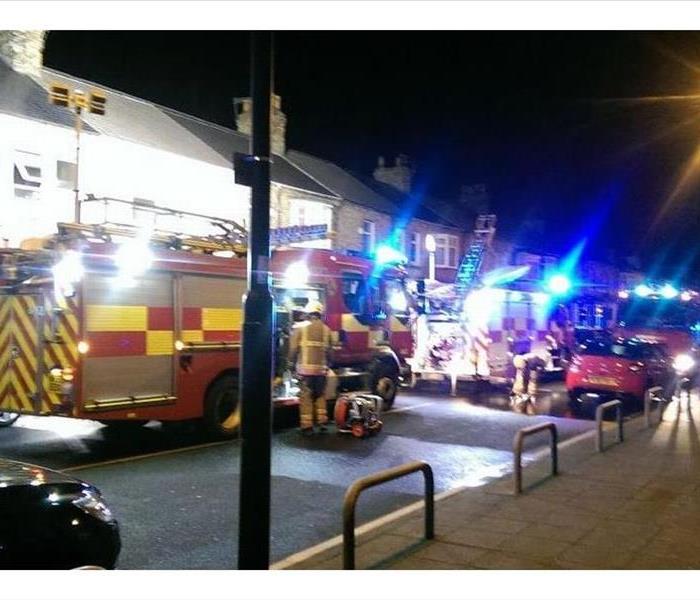 Fire Trucks at Fire
Fire Trucks at Fire
The fire has been put out by the firemen and they were able to save your family and your home. After they leave you walk back into your home onto saturated carpet, tile floors with puddles, charred walls and baseboards, soot, smoke odor and a huge hole in the wall where the fireman entered your home. This is a very devastating time in anyone’s life. This is when you call the Professionals for help. This is when you would call SERVPRO of Piatt/DeWitt County (217)-935-2992. The SERVPRO Professionals have specialized in fire and water damage restoration and move quickly to clean up and restore your home to pre-fire condition
SERVPRO can do any size board up to secure your home. The board up is important in keeping your home safe and secure until work can be scheduled. The Company also extracts water and has dehumidifiers.
SERVPRO of Piatt/DeWitt County can also take care of not only cleaning your sentimental items but are also equipped with the environmentally friendly cleaning products to clean your walls, carpet, and upholstery. SERVPRO also offers soda blasting. Soda blasting is also environmentally friendly and removes soot, badly charred and other types of residue caused by fire. The procedure may be used on brick, ceramic, glass, mortar, concrete and wood without damage. Along with cleaning it also helps to absorb the smoke odor.
SERVPRO provides equipment for helping with the odor. Air scrubbers, ozones and hydroxyls are 3 pieces of equipment that can be set up for odor. Once the structure has been cleaned and odor free, the Sevpro of Piatt/DeWitt County also has a Construction Department for the put back.
We are here for you in your most difficult time. All you have to do is call 217-935-2992.
Fire Starters
6/8/2020 (Permalink)
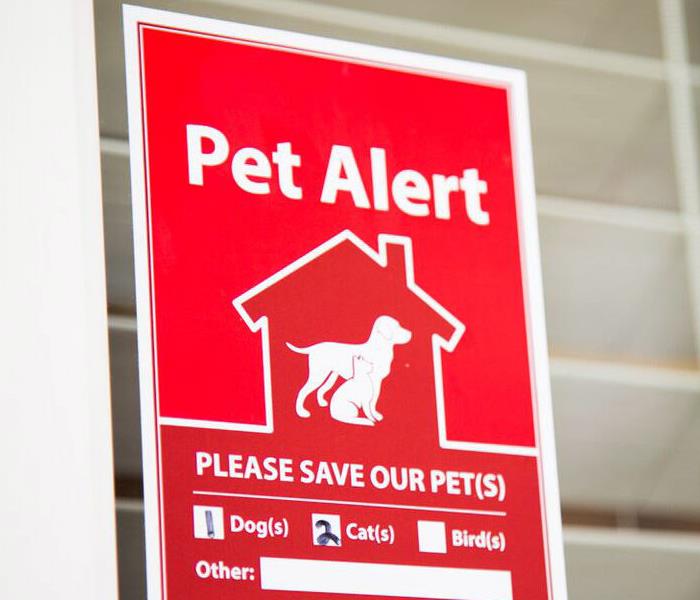 Pet Alert Window Cling
Pet Alert Window Cling
Many are unaware that nearly 1,000 residential fires a year are started by pets. We love our four-legged friends, but their natural curiosity can cause a devastating fire, especially when they’re left alone. To bring awareness to this, National Pet Fire Safety Day to take place every July 15th.
National Pet Fire Safety Day was created in 2007 by the American Kennel Club and ADT Security Services. The day is intended to educate pet owners about simple changes they can make that will help prevent house fires caused by pets. These changes could save your home or even the life of you and your pet.
Be Mindful Of Open Flames
Candles, stoves, and fireplaces should be carefully watched if pets are around. Besides being curious creatures who will sniff and paw at the pretty flames, wagging tails can also catch embers and knock over candlesticks.
Remove Stove Knobs
This may sound extreme, but having knobs on your stove that pets can turn has caused many house fires. If your dog is tall enough to reach the stove knobs, remove them or invest in safety knobs that won’t turn. This can save a lot of heartache later:
Forget Glass Water Bowls
Trade any glass water bowls for plastic or metal. If a glass water bowl is sitting outside on a sunny day, it can result in a “burning ants with a magnifying glass” effect and cause a fire on a wooden deck or even in the grass..
Use Fire Alert Window Clings
Many pet owners take advantage of fire alert window clings to help firefighters find which room their pets are located in in the event of a house fire. These window clings should always be updated to include how many pets you have in the house and should be on the window of every room where they are kept while you’re away.
Hide Your Electrical Cords
If your dog is a chewer, secure any electrical cords by covering them up or hiding them. An electric blanket can also be very deadly. A chewed-on cord can become damaged and spark, creating a risk for fires. Some pet owners even choose to unplug their electronics completely while they’re away, if their pets are big chewers or clawers.
Have A Plan
It’s very important to have an emergency plan in case of house fires, whether they’re started by your pet or not. Sadly, an estimated 40,000 pets die in house fires each year, so it’s absolutely crucial to have a solid plan in place. Practice escape routes with your pet, and be sure to include all members of your family to make sure everyone understands exactly what to do.
Anyone who owns a pet, specifically families with younger children, should take advantage of National Pet Safety Day and go over these safety measures and even have a safety drill to practice. Questions? Give one of our friendly staff here at SERVPRO of Piatt/DeWitt County a call by dialing 217-935-2992 today! We are here to help!
Top Five Causes of Home Fires and How to Avoid Them
5/20/2020 (Permalink)
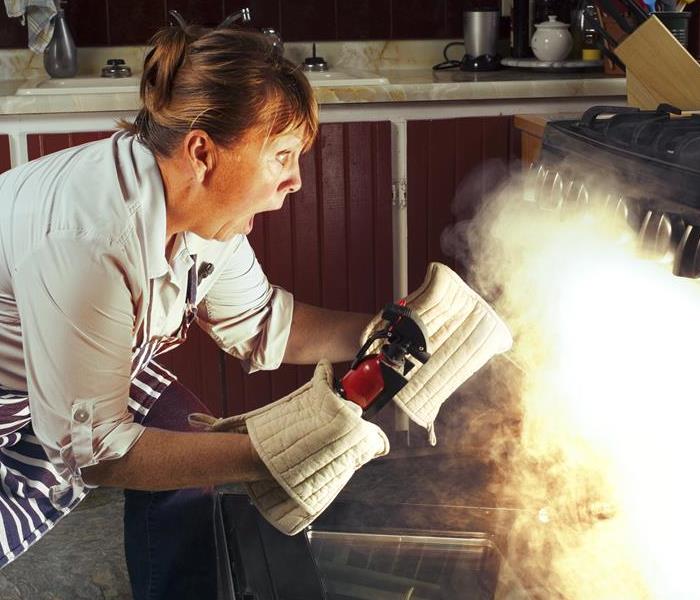 Lucy putting out a stove fire
Lucy putting out a stove fire
Home is where we relax, unwind, and connect with family and friends. This is our safe haven. Unfortunately, it’s also where nearly a third of all fires begin. To help keep your home and loved ones safe, here are some tips to prevent leading causes of fire in your home.
Cooking
Kitchens are the heart of a household and one of the most visited rooms in the home. The leading cause of fires in the home start in the kitchen. They’re responsible for almost half the injuries from home fires. Most kitchen fires involve the stove.
Safety Tips:
- Never leave the stove unattended. Turn off the stove if you leave the kitchen even for a brief time.
- Using a timer to remind you that you’re cooking is a great idea.
- Keep flammable items such as paper, packaging, towels, oven mitts and wooden cooking utensils away from the stove and oven.
- Never pour water on a grease fire, this will only make the fire worse.
- If you decide to fight a fire, smother it by turning off the burner and covering it with a metal or glass lid or pot. If you can’t extinguish the fire, leave the room, close the door and call 911.
Smoking
Smoking is the leading cause of fire deaths in the home. Cigarettes, pipes, cigars and other smoking materials started fires that caused 21 percent of home fire deaths. Tragically, one out of four victims was not even the smoker whose cigarette ignited the fire.
Safety Tips:
- If you smoke, do it outside. Many smoking fires begin in the bedroom or living room when the smoker falls asleep.
- Use a sturdy ashtray. Don’t toss cigars or cigarettes into bushes or leave
- Be cautious with E Cigarettes. It is not a good idea to leave them charging unattended or overnight. If the battery gets wet or damaged, replace it. Definitely don’t tamper with safety features.
- Smoking near where medical oxygen is used is very dangerous. It can make materials ignite more easily and fuel a faster fire.
Electrical and Lighting Equipment
Electrical equipment can also create hazards in the home. Wiring, lighting, electrical cords, and plugs cause about 10 percent of home fires each year.
Safety Tips:
- Having Arc-fault circuit interrupters installed to monitor a circuit’s electrical current and shut the circuit off if unintended arcing happens.
- Using light bulbs higher than the recommended wattage in lamps can be dangerous.
- Unplug appliances when not in use is a great idea.
- Being careful with electrical cords is very smart. Avoid in places where they could get run over or damaged.
- Child proof unused electrical outlets with child safety covers.
- Use lampshades or other covers to make sure a light bulb isn’t bare and radiating heat near flammable material.
- Call an electrician if you have sparks from an outlet or frequently blown fuses. It is a good idea to have a electrician you trust number on hand.
Heating equipment is the second main cause of home fire fatalities. December, January, and February are the peak months for home heating fires. Most heating fire deaths (86%) involve space heaters.
Safety Tips:
- Having a professional clean and inspect your chimney each year is a great idea. A leading factor in home heating fires was the failure to clean chimneys.
- Keep flammable materials away from heaters.
- Test smoke alarms once a month and change out batteries at least once if not twice a year.
- Vent fuel-burning equipment to the outside to avoid carbon monoxide poisoning.
Candles are a lot of fun especially around the holidays. The highest rates of home candle fires are on New Year’s Day, Christmas, and New Year’s Eve.
Safety Tips:
- Put candles out before going to bed. Sleeping was a factor in 11% of the home candle fires.
- Candles should be at least one foot away from anything that could catch fire.
- Place candles on a sturdy surface.
- Something we do not think of, but be careful when lighting candles to keep hair and clothing away from them. Don’t burn a candle all the way down.
- Keep lit candles out of reach of small children and pets.
Hopefully you found these tips helpful! We at SERVPRO of Piatt/DeWitt County, want you and your family and your home to be safe. In the unfortunate event you do have a fire, SERVPRO of Piatt/DeWitt County is here to help. We specialize in clean up of your home and cleaning your contents from furniture to clothing. Give us a call at 217-935-2992.
After the Fire trucks leave…..then what?
5/19/2020 (Permalink)
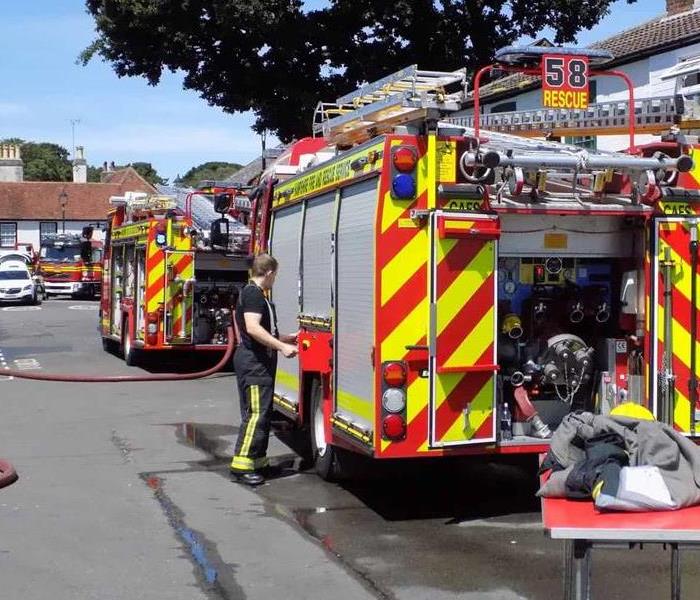 Fire Trucks at Fire
Fire Trucks at Fire
The fire has been put out by the firemen and they were able to save your family and your home. After they leave you walk back into your home onto saturated carpet, tile floors with puddles, charred walls and baseboards, soot, smoke odor and a huge hole in the wall where the fireman entered your home. This is a very devastating time in anyone’s life. This is when you call the Professionals for help. This is when you would call SERVPRO of Piatt/DeWitt County (217)-935-2992. The SERVPRO Professionals have specialized in fire and water damage restoration and move quickly to clean up and restore your home to pre-fire condition
SERVPRO can do any size board up to secure your home. The board up is important in keeping your home safe and secure until work can be scheduled. The Company also extracts water and has dehumidifiers.
SERVPRO of Piatt/DeWitt County can also take care of not only cleaning your sentimental items but are also equipped with the environmentally friendly cleaning products to clean your walls, carpet, and upholstery. SERVPRO also offers soda blasting. Soda blasting is also environmentally friendly and removes soot, badly charred and other types of residue caused by fire. The procedure may be used on brick, ceramic, glass, mortar, concrete and wood without damage. Along with cleaning it also helps to absorb the smoke odor.
SERVPRO provides equipment for helping with the odor. Air scrubbers, ozones and hydroxyls are 3 pieces of equipment that can be set up for odor. Once the structure has been cleaned and odor free, the SERVPRO of Piatt/DeWitt County also has a Construction Department for the put back.
We are here for you in your most difficult time. All you have to do is call 217-935-2992.
You've Had a Fire, Now What?
4/28/2020 (Permalink)
You had a fire, and now it's time to get your house or business back. Smoke and soot are more than a dirty little reminder of the disastrous fire that took its toll on your home, they can be very dangerous. Leftover smoke and soot following a fire are more than just smelly and unsightly. Exposure during fire restoration efforts can adversely affect your health. Children, the elderly, and those with weakened immune systems are particularly at risk when exposed to smoke and soot. Its effects have been known since the 18th century, when the British Parliament passed the Chimney Sweepers Act in response to its association with cancer, the first ever occupational health legislation.
When combustion occurs during a fire, not all materials burn cleanly, resulting in smoke and soot. These waste products - solids, liquids, and gases - may be composed of various chemicals which are harmful to your health. Today’s modern structures hold an array of chemicals not found in early homes, including plastics, foams, fabrics, carpets, wood products, synthetic fabrics, wool, and asbestos-containing materials, which could result in health hazards that make fire restoration a dangerous and difficult task.
Exposure to smoke and soot during fire restoration may occur via the skin and eyes, inhalation, and ingestion. Because airborne soot particulate is invisible, you may unknowingly be affected. Once soot enters your bloodstream, it can cause a wide array of serious health issues, including respiratory issues, shortness of breath, bronchitis, asthma, stroke, heart attack, cancer, and premature death. In infants, even short-term exposure to soot has been shown to have lifelong health consequences, permanently altering developing respiratory systems. Some of the contents that may be in a home or business are;
- Mesothelioma (cancer) causing asbestos fibers from building materials used in the 1950s-1980s.
- Carbon materials can produce carbon monoxide, hydrogen, ammonia, nitrogen oxides, and tar.
- PVC may create hydrogen chloride, phosgene, dioxin, chloromethane, bromomethane, and halocarbons.
- Sulfur can form hydrogen sulfide, sulfur dioxide, and thiols that can cause residual smoke odor.
- Partial oxidation of released hydrocarbons can yield formaldehyde, acrolein, furfural, ketones, alcohols, phenols, cresols, carboxylic acids, and more…
- Even wood smoke released shares more than 100 chemicals also found in cigarette smoke.
Unfortunately, safety risks from fire do not end once the flames are extinguished. Fire damage can linger for years unless properly addressed. Adequate safety equipment (respiratory, skin, and eye protection) are essential in reducing possible exposure to dangerous smoke and soot, and quite possibly water and mold related health issues resulting from firefighting efforts. Proper ventilation practices are also necessary to protect and restore indoor air quality following a fire, including HEPA filtration and adsorption (activated carbon) to preserve air quality. A bottle of degreaser and a dust mask are not enough! So where do you start? SERVPRO can help! The staff are highly trained, professional, knowledgeable, and have both the expertise and equipment needed for a safe and thorough fire restoration.
What Everyone Needs To Know About Fire Damage
3/13/2020 (Permalink)
 bathroom outlet fire
bathroom outlet fire
Fire Damage to Your Bathroom can Happen When Electrical Circuits Get Overloaded
Because of the risk of electrical shock, most homes in Piatt/DeWitt County have GFCI outlets in both the bathroom and the kitchen. Many people feel it is safe to use several different electrical gadgets at a time. A cell phone for music, a hair dryer, and curling or straightening irons are among the many things found plugged into a socket in the typical bathroom.
When the bathroom appliances in your home overload, fire damage and electric shock are prevented by the tripping of the outlet's switch. Overheating of devices can also cause small fires. Irons are one way this happens, but cords that have weakened areas due to twisting or age can also burn countertops. Towels and clothing nearby can catch on fire and cause considerable damage.
The soot produced by fires that burn synthetics like plastics has a very greasy feeling, heavy and dense. This soot makes a serious mess when someone tries to clean it up without the right cleaning equipment. SERVPRO technicians can have everything looking “Like it never even happened,” quickly because we have specialized tools and in-house cleaning compounds that strip soot away from surfaces with minimal spreading.
If your vanity has a Formica countertop, we can often restore this rather effortlessly. Sanding the burned area down to undamaged layers allows us to fill the depression in with a standard epoxy that dries without shrinkage. This can mean the difference between needing a new vanity and keeping the current one, a much less expensive option.
Removing soot from walls after a fire, as well as the ceiling can reveal if new paint should come next. If so, we apply a primer and then a paint of your choice. We mix in an antimicrobial agent that does not change the color to help prevent microbial infestations like mold and mildew.
Fire damaged homes often experience these problems after a fire because of the water used to extinguish the flames. We know that helping you prevent any additional damage through small measures like this go a long way toward saving you money, time, and inconvenience.
When GFCI is not enough to prevent a fire in your bathroom, call SERVPRO of Piatt/DeWitt County at (217)935-2992, to get fire damage mitigation started. Our IICRC-certified specialists can help get things back to normal. "Like it never even happened."
Getting Back Into Your House
2/3/2020 (Permalink)
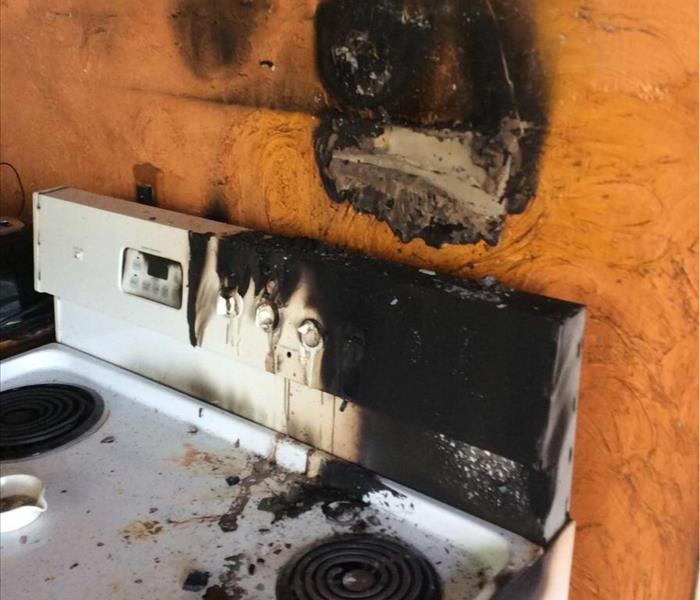 house fire loss due to a stove
house fire loss due to a stove
You had a fire, and now it's time to get your house back. Smoke and soot are more than a dirty little reminder of the disastrous fire that took its toll on your home; they can be very dangerous. Leftover smoke and soot following a fire are more than just smelly and unsightly. Exposure during fire restoration efforts can adversely affect your health. Children, the elderly, and those with weakened immune systems are particularly at risk when exposed to smoke and soot. Its effects have been known since the 18th century, when the British Parliament passed the Chimney Sweepers Act in response to its association with cancer, the first ever occupational health legislation.
When combustion occurs during a fire, not all materials burn cleanly, resulting in smoke and soot. These waste products - solids, liquids, and gases - may be composed of various chemicals which are harmful to your health. Today’s modern structures hold an array of chemicals not found in early homes, including plastics, foams, fabrics, carpets, wood products, synthetic fabrics, wool, and asbestos-containing materials, which could result in health hazards that make fire restoration a dangerous and difficult task.
Exposure to smoke and soot during fire restoration may occur via the skin and eyes, inhalation, and ingestion. Because airborne soot particulate is invisible, you may unknowingly be affected. Once soot enters your bloodstream, it can cause a wide array of serious health issues, including respiratory issues, shortness of breath, bronchitis, asthma, stroke, heart attack, cancer, and premature death. In infants, even short-term exposure to soot has been shown to have lifelong health consequences, permanently altering developing respiratory systems. Some of the contents that may be in a home or business are:
- Mesothelioma (cancer) causing asbestos fibers from building materials used in the 1950s-1980s.
- Carbon materials can produce carbon monoxide, hydrogen, ammonia, nitrogen oxides, and tar.
- PVC may create hydrogen chloride, phosgene, dioxin, chloromethane, bromomethane, and halocarbons.
- Sulfur can form hydrogen sulfide, sulfur dioxide, and thiols that can cause residual smoke odor.
- Partial oxidation of released hydrocarbons can yield formaldehyde, acrolein, furfural, ketones, alcohols, phenols, cresols, carboxylic acids, and more…
- Even wood smoke released shares more than 100 chemicals also found in cigarette smoke.
Unfortunately, safety risks from fire do not end once the flames are extinguished. Fire damage can linger for years unless properly addressed. Adequate safety equipment (respiratory, skin, and eye protection) are essential in reducing possible exposure to dangerous smoke and soot, and quite possibly water and mold related health issues resulting from firefighting efforts. Proper ventilation practices are also necessary to protect and restore indoor air quality following a fire, including HEPA filtration and adsorption (activated carbon) to preserve air quality. A bottle of degreaser and a dust mask are not enough! So where do you start? SERVPRO of Piatt/DeWitt County can help! The staff is highly trained, professional, knowledgeable, and have both the expertise and equipment needed for a safe and thorough fire restoration.
3 Steps To Take After A Fire
1/15/2020 (Permalink)
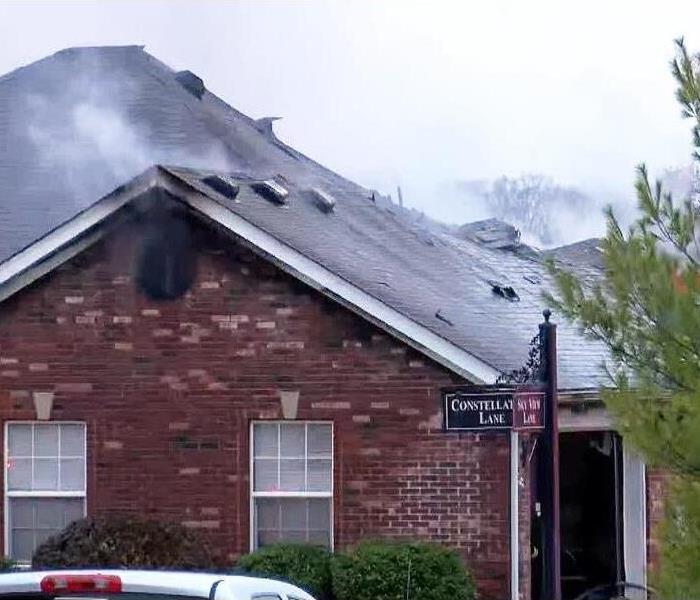 working house fire
working house fire
A fire in your Piatt/DeWitt County home can be devastating. There are people who can give you the assistance you need to rebuild your house if this happens. To expedite the fire restoration process, you will need to file a fire claim with your insurance company. Take these three steps right after the fire happens to make the process go more smoothly.
- Call Your Insurance Agent
The company that provides your fire insurance is the first call you should make after the flames have been put out. This starts the claims process. An adjuster comes to assess the damage and determine how much the insurance company will pay. The longer you wait to contact your insurance company, the higher the chance that your home will sustain damage that won't be covered.
- Vacate Your Property
You may be tempted to start cleaning up the moment you hang up from the call with your insurance agent. Fight this urge and leave damage mitigation to the professionals. Instead, take pictures of the damages so that you have an accurate record of them. You may also consider making a list of items that need to be replaced and the approximate replacement cost. This can help you when you are filing your claim, especially if the fire restoration cleanup starts before your adjuster arrives.
- Protect Your Home
It's likely that the fire that ravaged your home also left it vulnerable to the elements and unwanted guests. When fire remediation specialists arrive to start the smoke cleaning process, they will likely board up the parts of your home that normally would be closed to intruders, animals or bad weather. This can prevent further damage and save you the time and expense of extra repairs. Fire damage to your home can seem overwhelming. However, these are the few primary steps needed to start the fire restoration process. SERVPRO of Piatt/DeWitt County is ready to work with your insurance agent to return your home to preloss condition. Call or ask for SERVPRO at 217-935-2992, 24/7
Act Quickly
1/6/2020 (Permalink)
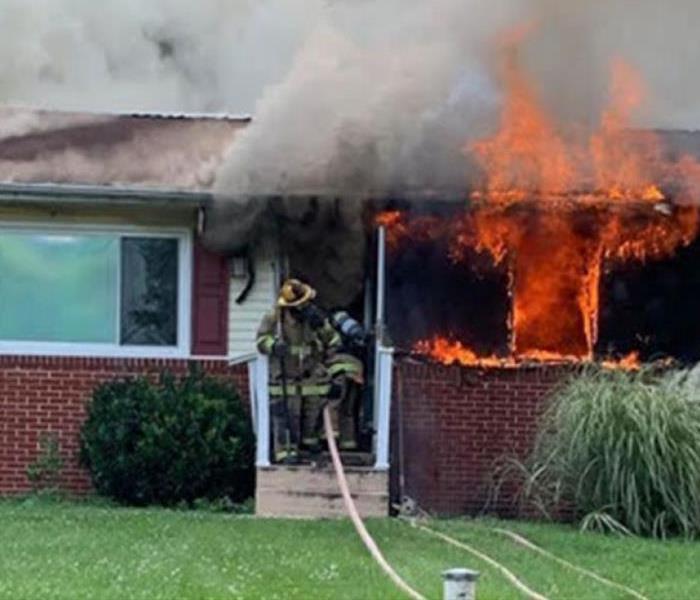 SERVPRO of Piatt/DeWitt County act quick to all fire calls
SERVPRO of Piatt/DeWitt County act quick to all fire calls
Fires can be devastating when they occur. It is crucial though when a fire strikes that you get the restoration process started immediately. The longer that it is put off the harder and more repairs will be needed. This also means the price of repairs goes up as well. SERVPRO of Piatt/DeWitt County specializes in fire damage and restoration. Contacting us is the first step in getting the restoration underway. SERVPRO will try to save as much of your home and personal belongings that we can. Remember that safety comes first, so if there’s no way to safely gain access into your home, stay out until SERVPRO professionals arrive. On arrival we perform a thorough cleanup using our industrial-grade products and equipment, such as dry cleaning soot sponges to remove loose soot and specialized vacuum filters to clean carpet and upholstery. Unfortunately fires happen, but when they do make sure you act quickly to get the damage cleaned up. SERVPRO of Piatt/DeWitt County takes fire damage and leaves it "Like it never even happened." Call SERVPRO of Piatt/DeWitt County for your fire restoration needs anytime at (217) 935-2992
Holiday Fire Safety
12/2/2019 (Permalink)
 Christmas Living room
Christmas Living room
Residential fires during the holiday season are more frequent, more costly, and more deadly than at any other time of the year. The U.S. Fire Administration (USFA) reports more than double the number of open-flame fires on Christmas Day than on an average day, and about twice as many on New Year’s Day. And when those fires occur, they do more damage: Property loss during a holiday fire is 34% greater than in an average fire, and the number of fatalities per thousand fires is nearly 70% higher. When the source of the fire is a highly flammable Christmas tree, the toll in property and lives is even greater.
To keep your household from becoming a holiday fire statistic, here are some safety tips to follow.
Cooking
Cooking is the top cause of holiday fires, according to the USFA. The most common culprit is food that’s left unattended. It’s easy to get distracted; take a pot holder with you when you leave the kitchen as a reminder that you have something on the stove. Make sure to keep a kitchen fire extinguisher that’s rated for all types of fires, and check that smoke detectors are working.
If you’re planning to deep-fry your holiday turkey, do it outside, on a flat, level surface at least 10 feet from the house.
Candles
The incidence of candle fires is four times higher during December than during other months. According to the National Fire Protection Association, four of the five most dangerous days of the year for residential candle fires are Christmas/Christmas Eve and New Year’s/New Year’s Eve. (The fifth is Halloween.)
To reduce the danger, maintain about a foot of space between the candle and anything that can burn. Set candles on sturdy bases or cover with hurricane globes. Never leave flames unattended. Before bed, walk through each room to make sure candles are blown out. For atmosphere without worry, consider flameless LED candles.
Christmas Trees
It takes less than 30 seconds for a dry tree to engulf a room in flames, according to the Building and Fire Research Laboratory of the National Institute for Standards and Technology. “They make turpentine out of pine trees,” notes Tom Olshanski, spokesman for the USFA. “A Christmas tree is almost explosive when it goes.”
To minimize risk, buy a fresh tree with intact needles, get a fresh cut on the trunk, and water it every day. A well-watered tree is almost impossible to ignite. Keep the tree away from heat sources, such as a fireplace or radiator, and out of traffic patterns. If you’re using live garlands and other greenery, keep them at least three feet away from heating sources.
No matter how well the tree is watered, it will start to dry out after about four weeks, Olshanski says, so take it down after the holidays. Artificial trees don’t pose much of a fire hazard; just make sure yours is flame-retardant.
Decorative Lights
Inspect light strings, and throw out any with frayed or cracked wires or broken sockets. When decorating, don’t run more than three strings of lights end to end. “Stacking the plugs is much safer when you’re using a large quantity of lights,” explains Brian L. Vogt, director of education for holiday lighting firm Christmas Décor. Extension cords should be in good condition and UL-rated for indoor or outdoor use. Check outdoor receptacles to make sure the ground fault interrupters don’t trip. If they trip repeatedly, Vogt says, that’s a sign that they need to be replaced.
When hanging lights outside, avoid using nails or staples, which can damage the wiring and increase the risk of a fire. Instead, use UL-rated clips or hangers. And take lights down within 90 days, says John Drengenberg, director of consumer safety for Underwriters Laboratories. “If you leave them up all year round, squirrels chew on them and they get damaged by weather.”
Fireplaces
Soot can harden on chimney walls as flammable creosote, so before the fireplace season begins, have your chimney inspected to see if it needs cleaning. Screen the fireplace to prevent embers from popping out onto the floor or carpet, and never use flammable liquids to start a fire in the fireplace. Only burn seasoned wood — no wrapping paper.
When cleaning out the fireplace, put embers in a metal container and set them outside to cool for 24 hours before disposal.
Should you have a fire emergency, no matter how big or how small, we here at SERVPRO of Piatt/DeWitt are ready to help 24 hours a day! Call us today at (217)935-2992..
Every Second Counts
6/17/2019 (Permalink)
In a fire, seconds count. Seconds can mean the difference between residents of our community escaping safely from a fire or having their lives end in tragedy.
This reinforces why everyone needs to have an escape plan. Here are some key messages to employ:
- Draw a map of your home with all members of your household, marking two exits from each room and a path to the outside from each exit.
- Practice your home fire drill twice a year. Conduct one at night and one during the day with everyone in your home, and practice using different ways out.
- Teach children how to escape on their own in case you can’t help them.
- Make sure the number of your home is clearly marked and easy for the fire department to find.
- Close doors behind you as you leave – this may slow the spread of smoke, heat, and fire.
- Once you get outside, stay outside. Never go back inside a burning building.
via http://www.nfpa.org/
Have you contacted your local fire department? See how you can get involved with them and your community to prevent house fires. Sometimes they will have events or give out smoke detectors for your home. Don't think this could never happen to you because it easily could. We don't have control over everything in our homes! Be safe and have a plan!
Reach out to us at (217)935-2992.[JB]
Residential Lightning Damage Happens More than You Think
6/7/2019 (Permalink)
Strikes happen an average of twice a year!
Here at SERVPRO of Piatt/Dewitt Counties, we can help you with fire damages caused by lightning strikes. When the lightning hits a residence, it travels through the electrical lines to one of the home’s electrical boxes, which can catch fire. These fires can leave severe damage, including smoke damage to your home. SERVPRO of Piatt/Dewitt Counties mitigation team has the ability to do a chem-sponge technique that is used to clean soot off of the walls. In doing this, SERVPRO of Piatt/Dewitt Counties can ensure that no fire damage or smoke damage goes untreated. If needed, affected walls in all damaged rooms can be painted after the cleanup is completed and drywall replaced where necessary. Our professional in-house crew use a white-glove treatment on your residence and can complete the entire project quickly; from the first contact to completion. Here at SERVPRO of Piatt/Dewitt Counties, we are proud to serve the residents of Piatt/Dewitt Counties, especially when the worst happens. Why chose SERVPRO? Because in the event of fire or water damage, large or small, we’re here to help. Call us in Piatt/Dewitt Counties at (217)935-2992. [JB]
3 Fire Hazards to Avoid This Spring
4/16/2019 (Permalink)
Spring time is such a fun, beautiful time of year. Stay safe out there!
The weather is warmer, the trees are blooming, and my allergies are killing me. Spring has officially sprung! That being said, there are still a wide variety of fire hazards that you should watch out for, even during the warm months.
1.Grills: Whether you’re cooking burgers for the family event or grilling up kabobs for dinner, you will inherently deal with a fire. Most are gas grills, which presents an even greater risk. In fact, the NFPA (https://www.nfpa.org/News-and-Research/Data-research-and-tools/US-Fire-Problem/Home-Grill-Fires) reports that an average of 9,600 home fires is caused by grilling each year. Here are some fire safety tips for the grill:
- Always check for any potential fire hazards before firing up the grill.
- If the grill does not light the first time, let the gas dissipate for at least 5 minutes before attempting to light the grill again.
- Be sure the grill is clean before using to get rid of oil and gas residue.
- Make sure the grill is set up in an open, outdoor area and keep it a good distance from the house and railings.
- Dryers: This is a fire hazard year round. In fact, the leading cause of clothes-dryer related fires is a failure to keep the lint baskets clean. Lint is combustible. Lint causes fires. It takes seconds to clean out the lint basket, so just make a habit of it when you get your clothes out of the dryer. If you have space for a clothesline in the spring and summer months - use it! There’s nothing better than fresh, air dried clothes. The NFPA also recommends cleaning out the vent pipe at least once a year so lint or other flammable particles do not get stuck in the vent pipe.
- Outdoor Fire Pits and Bonfires: The necessary safety precautions for an outdoor fire pit are pretty obvious, but keep these in mind when you’re having a party on a cool spring night.
- Always have an adult present around a fire. Never leave children unattended!
- Always have a bucket of water or a water hose available nearby if things get out of hand.
- Build the fire away from homes, porches, low-hanging trees, or any other fire hazards.
- Monitor the number of leaves, pine needles, paper, and other contents are fed into the fire since these items catch fire quickly and result in high flames and floating embers.
- Always put the fire out completely before leaving the fire unattended. Don't expect it to die down on its own!
We are always Here to Help when you need us. Call us at SERVPRO of Piatt/Dewitt Counties any time at (217)935-2992. Happy Spring!
Who Can You Trust to Restore Your Business After Fire Damage? SERVPRO Of Course!
3/5/2019 (Permalink)
 No matter how severe the damage is, our team will restore your business.
No matter how severe the damage is, our team will restore your business.
Assistance Helps Speed Up Recovery after Commercial Fire Damage in Piatt and Dewitt Counties
Fires in commercial establishments can be very devastating. Apart from the loss they cause by damaging the structure and contents, they also lead to business closure, which translates to lost revenue. The longer it takes to resume normal operations, the higher the cost of lost opportunities. In the worst cases, the business might even lose customers. We offer restoration services that help commercial establishments recover faster after fire incidents. FSRT certification means our customers benefit from a combination of top-notch equipment and advanced skill sets throughout the restoration process.
The steps are taken immediately restoration starts can quicken, or hamper the speed of recovery after commercial fire damage in Piatt and Dewitt Counties. Our SERVPRO technicians rely on their IICRC training to do a thorough evaluation before starting the restoration process. Such evaluation helps us establish the primary form of damage. Depending on the materials and items present in the affected area, it could be a case of predominant flame or smoke damage. If it is a case of smoke damage, we need to establish whether wet or dry smoke is the most prevalent. Having such information helps determine the level of agitation, chemical action and dwell time needed for effective cleaning.
Commercial spaces can present unique size challenges. In a space like a warehouse, the sheer size of the walls, ceilings and other areas that require cleaning can prolong the restoration. In a hotel or office space, the challenge could be large surfaces such as glass windows that require special care to avoid problems like streaking. Our SERVPRO crews use special equipment such as mobile scissor lifts, spotting pad holders and extensions poles when cleaning up vast surfaces saving time.
Our SERVPRO team considers the entire restoration process to determine how much effort to put into each phase, which also helps save time. For instance, if restoration involves repainting the affected surfaces, we clean to remove debris and neutralize the acids in smoke residue then restore the visual appeal though painting.
Restoring your fire-damaged premises should not take too long. Call SERVPRO of Piatt/Dewitt Counties to assist. You can reach us at (217) 935-2992 any time.
Why Hiring a Professional Restoration Company to Clean Up After Your Home Experiences a Fire Is the Best Choice
2/18/2019 (Permalink)
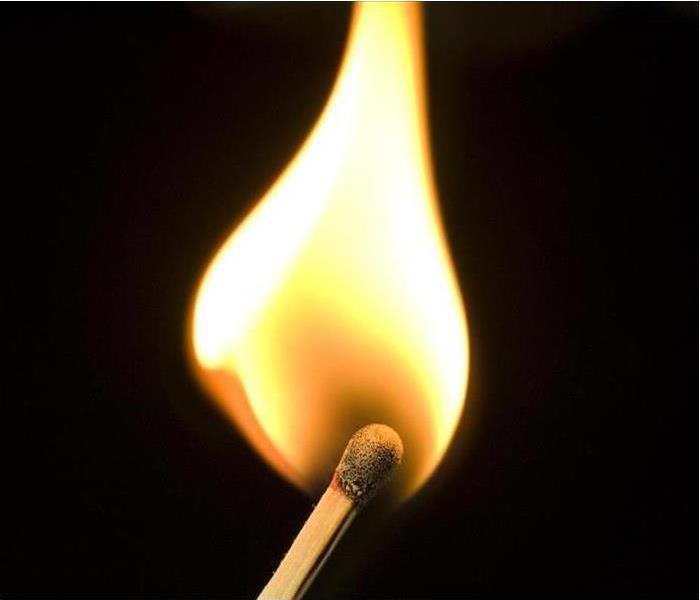 Fire damage in Piatt/Dewitt Counties does not have to be a headache.
Fire damage in Piatt/Dewitt Counties does not have to be a headache.
The principle of cleaning after fire damage in Piatt/Dewitt Counties
Surviving the aftermath of the fire damage can be quite a relief. However, the replacement and repairs can be very detrimental. Luckily, there are some insurance companies out there who would help with the costs. However, dealing with the aftermath does require some skills and expertise. The cleaning process isn’t an easy task. Keep in mind that it requires extensive inspection, identifying types of residues and services, removing the residues and disposal. All this should be taken care of by a fire restoration specialist. After all, doing this on your own can be very dangerous, exhausting, time-consuming, and expensive.
Fire damage in Piatt/Dewitt Counties does not have to be a headache. The situation is mainly because the SERVPRO tech can take care of everything. They can start by inspecting that areas near the source of the fire and see how far the damage has moved through various structures. There are different types of smoke residues, and the SERVPRO specialist can select a cleaning method that can effectively remove these residues. Another thing to note is that the type of surface that has undergone the fire damage may require specialized cleaning method and products that are sale to use on the surface. The fire restoration experts may have to be cautious to preserve the materials or surface during the cleaning process.
Since smoke residues can bind to the surface that they come in contact with, the fire experts can use a dry and wet screening process to release the particles away from the affected surface. The restorer can adequately get rid of the debris and cleaning waste. Once everything is completed, the technicians can walk you through your how to make sure that you are satisfied with the results.
If you are interested in getting a specialist to clean and restore you home after fire damage, then give SERVPRO of Piatt/Dewitt Counties a call at (217)935-2992 and we can promptly send our experts to your home. (LB)
How to Efficiently Extinguish a Grease Fire
1/30/2019 (Permalink)
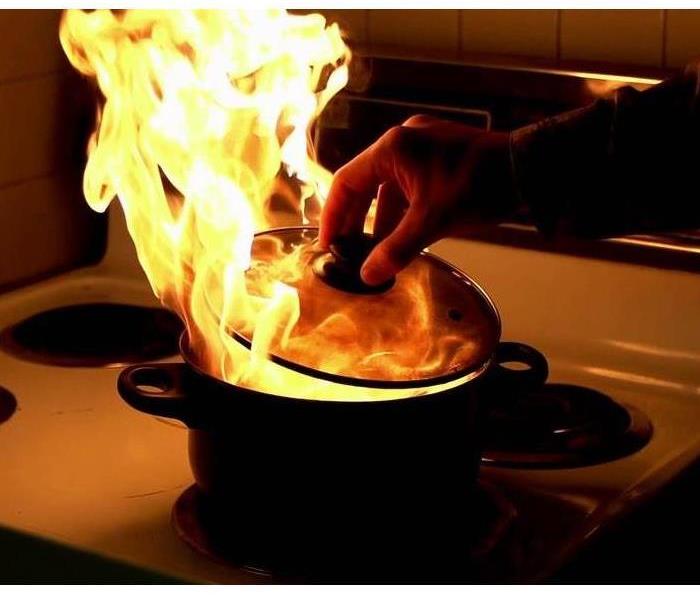 If you are unsure if you can safely extinguish any fire, Call 911.
If you are unsure if you can safely extinguish any fire, Call 911.
A grease fire can erupt suddenly and spread quickly. To help minimize damage, it’s important to quickly extinguish any kitchen blaze. However, certain actions may be highly ineffective and can jeopardize your safety. For this reason, it’s crucial to understand the appropriate techniques to smolder a grease-fueled inferno.
What Not To Do
There are several procedures that every homeowner in Piatt/Dewitt counties should avoid doing in the event of a kitchen fire involving grease:
- Fanning the flames with a dishcloth
- Pouring water over the inferno
- Transporting the burning pot outside
Each of these measures is counterproductive and may cause flames to spread
Smolder the Flames
Once the stove is off, you should cover the flaming pot with a metal lid or baking sheet. Avoid using glass or ceramic items because the intense heat may cause these materials to shatter.
As an alternative, you can also douse flames with baking soda. However, this technique is only effective against small fires and should not be attempted on larger infernos.
Utilize on Appropriate Fire Extinguisher
If the blaze is no longer contained inside the pot, use a Class B, K or multipurpose fire extinguisher to smolder the flames. Because it contains pressurized water, a Class A extinguisher is not suitable for use on flammable liquids. For safety reason, you should check the label before engaging any extinguisher to verify the type of fire it’s designed to battle.
Call 911
Attempting to battle a large inferno can be extremely dangerous. If flames spread, evacuate the premises and call 911 for assistance.
Be prepared
To quickly extinguish a grease fire, it’s imperative that you remain alert. Keeping a metal lid and fire extinguisher accessible while cooking can help you respond quickly, reducing the risk of a damaging blaze requiring a tedious fire cleanup.
Call SERVPRO of Piatt/Dewitt Counties for any fire damage emergency needs. Reach us 24/7 at (217) 935-2992.
Emergency Tips: Fire/Smoke Damage Do's and Don'ts
1/17/2019 (Permalink)
Do
- Limit movement in the home to prevent soot particles from being embedded into upholstery and carpet.
- Keep hands clean; Soot on hands can further soil upholstery, walls, and woodwork.
- Place dry, colorfast towels or old linens on rugs, upholstery and carpet traffic areas.
- If electricity is off, empty freezer and refrigerator completely and prop doors open to help.
- Wipe soot from chrome on kitchen and bathroom faucets, trim, and appliances, and then protect these surfaces with a light coating of lubricant.
- If heat is off during winter, pour RV antifreeze in sinks, toilet bowls, holding tanks and tubs to avoid freezing pipes and fixtures.
- Wash both sides of leaves on house plants.
- Change HVAC filter, but leave system off until a trained professional can check the system.
Don't
- Attempt to wash any walls to painted surfaces without first contacting your SERVPRO Franchise Professional.
- Attempt to shampoo carpet or upholstered furniture without first consulting your SERVPRO Franchise Professional.
- Attempt to clean any electrical appliances (TV sets, radios,etc.) that may have been close to fire, heat, or water without first consulting an authorized repair service.
- Consume any food or beverages that may have been stored close to fire, heat, or water (may be contaminated)
- Turn on ceiling fixtures of ceiling is wet. Wiring may be wet or damaged and cause electrical shock, and air movement may create secondary damage.
- Send garments to dry cleaner. Improper cleaning may set in smoke odor.
Call SERVPRO of Piatt/Dewitt today with any of your Fire and Water damage needs at (217) 935-2992.
Holiday Fire Safety Tips
12/1/2018 (Permalink)
Residential fires during the holiday season are more frequent, more costly, and more deadly than at any other time of the year. The U.S. Fire Administration (USFA) reports more than double the number of open-flame fires on Christmas Day than on an average day, and about twice as many on New Year’s Day. And when those fires occur, they do more damage: Property loss during a holiday fire is 34% greater than in an average fire, and the number of fatalities per thousand fires is nearly 70% higher. When the source of the fire is a highly flammable Christmas tree, the toll in property and lives is even greater.
To keep your household from becoming a holiday fire statistic, here are some safety tips to follow.
Cooking
Cooking is the top cause of holiday fires, according to the USFA. The most common culprit is food that’s left unattended. It’s easy to get distracted; take a pot holder with you when you leave the kitchen as a reminder that you have something on the stove. Make sure to keep a kitchen fire extinguisher that’s rated for all types of fires, and check that smoke detectors are working.
If you’re planning to deep-fry your holiday turkey, do it outside, on a flat, level surface at least 10 feet from the house.
Candles
The incidence of candle fires is four times higher during December than during other months. According to the National Fire Protection Association, four of the five most dangerous days of the year for residential candle fires are Christmas/Christmas Eve and New Year’s/New Year’s Eve. (The fifth is Halloween.)
To reduce the danger, maintain about a foot of space between the candle and anything that can burn. Set candles on sturdy bases or cover with hurricane globes. Never leave flames unattended. Before bed, walk through each room to make sure candles are blown out. For atmosphere without worry, consider flameless LED candles.
Christmas Trees
It takes less than 30 seconds for a dry tree to engulf a room in flames, according to the Building and Fire Research Laboratory of the National Institute for Standards and Technology. “They make turpentine out of pine trees,” notes Tom Olshanski, spokesman for the USFA. “A Christmas tree is almost explosive when it goes.”
To minimize risk, buy a fresh tree with intact needles, get a fresh cut on the trunk, and water it every day. A well-watered tree is almost impossible to ignite. Keep the tree away from heat sources, such as a fireplace or radiator, and out of traffic patterns. If you’re using live garlands and other greenery, keep them at least three feet away from heating sources.
No matter how well the tree is watered, it will start to dry out after about four weeks, Olshanski says, so take it down after the holidays. Artificial trees don’t pose much of a fire hazard; just make sure yours is flame-retardant.
Decorative Lights
Inspect light strings, and throw out any with frayed or cracked wires or broken sockets. When decorating, don’t run more than three strings of lights end to end. “Stacking the plugs is much safer when you’re using a large quantity of lights,” explains Brian L. Vogt, director of education for holiday lighting firm Christmas Décor. Extension cords should be in good condition and UL-rated for indoor or outdoor use. Check outdoor receptacles to make sure the ground fault interrupters don’t trip. If they trip repeatedly, Vogt says, that’s a sign that they need to be replaced.
When hanging lights outside, avoid using nails or staples, which can damage the wiring and increase the risk of a fire. Instead, use UL-rated clips or hangers. And take lights down within 90 days, says John Drengenberg, director of consumer safety for Underwriters Laboratories. “If you leave them up all year round, squirrels chew on them and they get damaged by weather.”
Fireplaces
Soot can harden on chimney walls as flammable creosote, so before the fireplace season begins, have your chimney inspected to see if it needs cleaning. Screen the fireplace to prevent embers from popping out onto the floor or carpet, and never use flammable liquids to start a fire in the fireplace. Only burn seasoned wood — no wrapping paper.
When cleaning out the fireplace, put embers in a metal container and set them outside to cool for 24 hours before disposal.
Should you have a fire emergency, no matter how big or how small, we here at SERVPRO are ready to help 24 hours a day! Call us today at (217)935-2992.




 24/7 Emergency Service
24/7 Emergency Service


